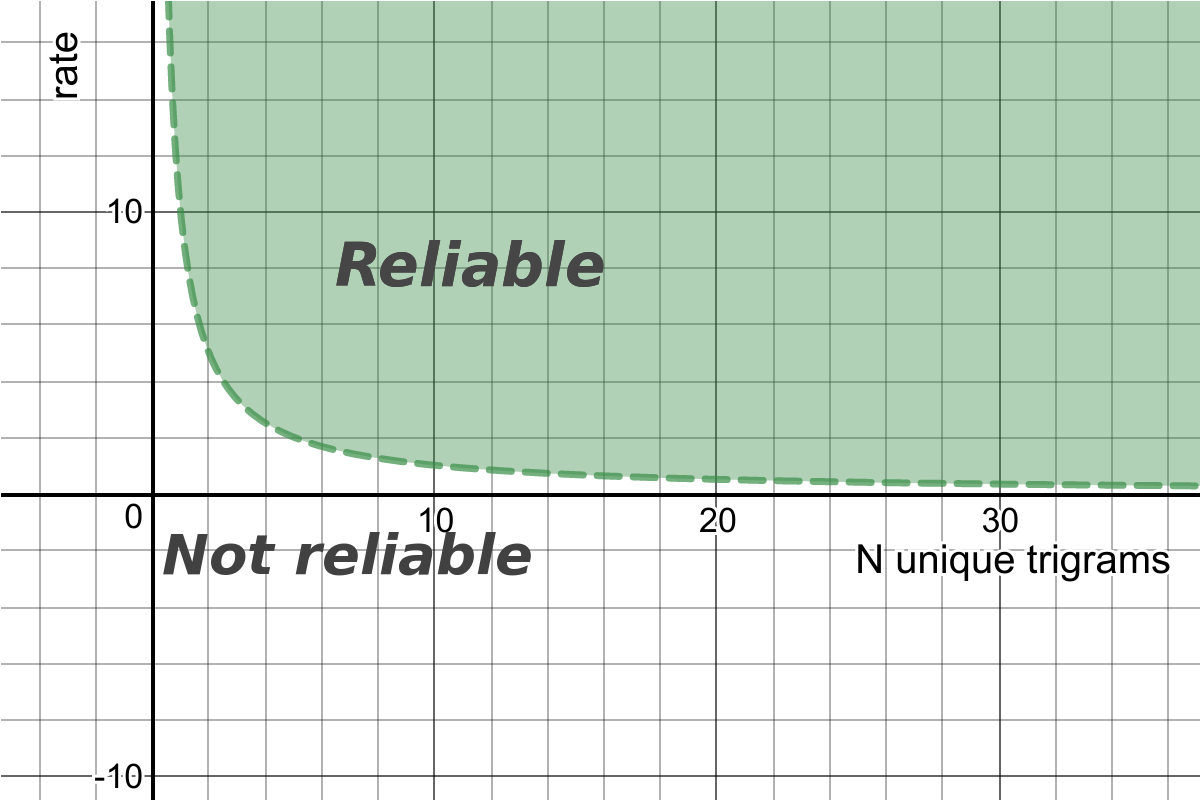# Whatlang
[](https://travis-ci.org/greyblake/whatlang-rs)
[](https://raw.githubusercontent.com/greyblake/whatlang-rs/master/LICENSE)
[](https://docs.rs/whatlang)
Natural language detection for Rust with focus on simplicity and performance.
* [Features](#features)
* [Get started](#get-started)
* [Documentation](https://docs.rs/whatlang)
* [Supported languages](https://github.com/greyblake/whatlang-rs/blob/master/SUPPORTED_LANGUAGES.md)
* [How does it work?](#how-does-it-work)
* [How language recognition works?](#how-language-recognition-works)
* [How is_reliable calculated?](#how-is_reliable-calculated)
* [Running benchmark](#running-benchmarks)
* [Ports and clones](ports-and-clones)
* [Derivation](#derivation)
* [License](#license)
* [Contributors](#contributors)
## Features
* Supports [84 languages](https://github.com/greyblake/whatlang-rs/blob/master/SUPPORTED_LANGUAGES.md)
* 100% written in Rust
* Lightweight, fast and simple
* Recognizes not only a language, but also a script (Latin, Cyrillic, etc)
* Provides reliability information
* No external dependencies (apart from [fnv](https://crates.io/crates/fnv) hasher, that gives 30% boost)
## Get started
Add to you `Cargo.toml`:
```
[dependencies]
whatlang = "0.4.0"
```
Example:
```rust
use whatlang::{detect, Lang, Script};
let text = "Ĉu vi ne volas eklerni Esperanton? Bonvolu! Estas unu de la plej bonaj aferoj!";
let info = detect(text).unwrap();
assert_eq!(info.lang(), Lang::Epo);
assert_eq!(info.script(), Script::Latin);
assert_eq!(info.confidence(), 1.0);
assert!(info.is_reliable());
```
For more details (e.g. how to blacklist some languages) please check the [documentation](https://docs.rs/whatlang).
## How does it work?
### How language recognition works?
The algorithm is based on the trigram language models, which is a particular case of n-grams.
To understand the idea, please check the original whitepaper [Cavnar and Trenkle '94: N-Gram-Based Text Categorization'](http://odur.let.rug.nl/~vannoord/TextCat/textcat.pdf).
### How _is_reliable_ calculated?
It is based on the following factors:
* How many unique trigrams are in the given text
* How big is the difference between the first and the second(not returned) detected languages? This metric is called `rate` in the code base.
Therefore, it can be presented as 2d space with threshold functions, that splits it into "Reliable" and "Not reliable" areas.
This function is a hyperbola and it looks like the following one:

For more details, please check a blog article [Introduction to Rust Whatlang Library and Natural Language Identification Algorithms](http://greyblake.com/blog/2017/07/30/introduction-to-rust-whatlang-library-and-natural-language-identification-algorithms/).
## Running benchmarks
This is mostly useful to test performance optimizations.
```
cargo bench
```
## Ports and clones
* [whatlanggo](https://github.com/abadojack/whatlanggo) - whatlang clone for Go language
## Derivation
**Whatlang** is a derivative work from [Franc](https://github.com/wooorm/franc) (JavaScript, MIT) by [Titus Wormer](https://github.com/wooorm).
## License
[MIT](https://github.com/greyblake/whatlang-rs/blob/master/LICENSE) © [Sergey Potapov](http://greyblake.com/)
## Contributors
- [greyblake](https://github.com/greyblake) Potapov Sergey - creator, maintainer.
- [Dr-Emann](https://github.com/Dr-Emann) Zachary Dremann - optimization and improvements